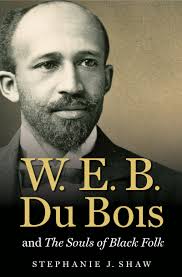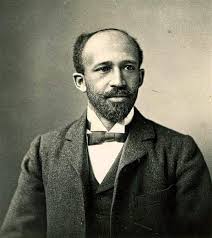The Souls of Black Folk Page #8
The Souls of Black Folk is a 1903 work of American literature by W. E. B. Du Bois. It is a seminal work in the history of sociology and a cornerstone of African-American literature. The book contains several essays on race, some of which the magazine Atlantic Monthly had previously published.
In the work of establishing the Negroes as peasant proprietors, the Bureau was from the first handicapped and at last absolutely checked. Something was done, and larger things were planned; abandoned lands were leased so long as they remained in the hands of the Bureau, and a total revenue of nearly half a million dollars derived from black tenants. Some other lands to which the nation had gained title were sold on easy terms, and public lands were opened for settlement to the very few freedmen who had tools and capital. But the vision of “forty acres and a mule’—the righteous and reasonable ambition to become a landholder, which the nation had all but categorically promised the freedmen—was destined in most cases to bitter disappointment. And those men of marvellous hindsight who are today seeking to preach the Negro back to the present peonage of the soil know well, or ought to know, that the opportunity of binding the Negro peasant willingly to the soil was lost on that day when the Commissioner of the Freedmen’s Bureau had to go to South Carolina and tell the weeping freedmen, after their years of toil, that their land was not theirs, that there was a mistake—somewhere. If by 1874 the Georgia Negro alone owned three hundred and fifty thousand acres of land, it was by grace of his thrift rather than by bounty of the government. The greatest success of the Freedmen’s Bureau lay in the planting of the free school among Negroes, and the idea of free elementary education among all classes in the South. It not only called the school-mistresses through the benevolent agencies and built them schoolhouses, but it helped discover and support such apostles of human culture as Edmund Ware, Samuel Armstrong, and Erastus Cravath. The opposition to Negro education in the South was at first bitter, and showed itself in ashes, insult, and blood; for the South believed an educated Negro to be a dangerous Negro. And the South was not wholly wrong; for education among all kinds of men always has had, and always will have, an element of danger and revolution, of dissatisfaction and discontent. Nevertheless, men strive to know. Perhaps some inkling of this paradox, even in the unquiet days of the Bureau, helped the bayonets allay an opposition to human training which still to-day lies smouldering in the South, but not flaming. Fisk, Atlanta, Howard, and Hampton were founded in these days, and six million dollars were expended for educational work, seven hundred and fifty thousand dollars of which the freedmen themselves gave of their poverty. Such contributions, together with the buying of land and various other enterprises, showed that the ex-slave was handling some free capital already. The chief initial source of this was labor in the army, and his pay and bounty as a soldier. Payments to Negro soldiers were at first complicated by the ignorance of the recipients, and the fact that the quotas of colored regiments from Northern States were largely filled by recruits from the South, unknown to their fellow soldiers. Consequently, payments were accompanied by such frauds that Congress, by joint resolution in 1867, put the whole matter in the hands of the Freedmen’s Bureau. In two years six million dollars was thus distributed to five thousand claimants, and in the end the sum exceeded eight million dollars. Even in this system fraud was frequent; but still the work put needed capital in the hands of practical paupers, and some, at least, was well spent. The most perplexing and least successful part of the Bureau’s work lay in the exercise of its judicial functions. The regular Bureau court consisted of one representative of the employer, one of the Negro, and one of the Bureau. If the Bureau could have maintained a perfectly judicial attitude, this arrangement would have been ideal, and must in time have gained confidence; but the nature of its other activities and the character of its personnel prejudiced the Bureau in favor of the black litigants, and led without doubt to much injustice and annoyance. On the other hand, to leave the Negro in the hands of Southern courts was impossible. In a distracted land where slavery had hardly fallen, to keep the strong from wanton abuse of the weak, and the weak from gloating insolently over the half-shorn strength of the strong, was a thankless, hopeless task. The former masters of the land were peremptorily ordered about, seized, and imprisoned, and punished over and again, with scant courtesy from army officers. The former slaves were intimidated, beaten, raped, and butchered by angry and revengeful men. Bureau courts tended to become centres simply for punishing whites, while the regular civil courts tended to become solely institutions for perpetuating the slavery of blacks. Almost every law and method ingenuity could devise was employed by the legislatures to reduce the Negroes to serfdom,—to make them the slaves of the State, if not of individual owners; while the Bureau officials too often were found striving to put the “bottom rail on top,” and gave the freedmen a power and independence which they could not yet use. It is all well enough for us of another generation to wax wise with advice to those who bore the burden in the heat of the day. It is full easy now to see that the man who lost home, fortune, and family at a stroke, and saw his land ruled by “mules and niggers,” was really benefited by the passing of slavery. It is not difficult now to say to the young freedman, cheated and cuffed about who has seen his father’s head beaten to a jelly and his own mother namelessly assaulted, that the meek shall inherit the earth. Above all, nothing is more convenient than to heap on the Freedmen’s Bureau all the evils of that evil day, and damn it utterly for every mistake and blunder that was made. All this is easy, but it is neither sensible nor just. Someone had blundered, but that was long before Oliver Howard was born; there was criminal aggression and heedless neglect, but without some system of control there would have been far more than there was. Had that control been from within, the Negro would have been re-enslaved, to all intents and purposes. Coming as the control did from without, perfect men and methods would have bettered all things; and even with imperfect agents and questionable methods, the work accomplished was not undeserving of commendation. uch was the dawn of Freedom; such was the work of the Freedmen’s Bureau, which, summed up in brief, may be epitomized thus: for some fifteen million dollars, beside the sums spent before 1865, and the dole of benevolent societies, this Bureau set going a system of free labor, established a beginning of peasant proprietorship, secured the recognition of black freedmen before courts of law, and founded the free common school in the South. On the other hand, it failed to begin the establishment of good-will between ex-masters and freedmen, to guard its work wholly from paternalistic methods which discouraged self-reliance, and to carry out to any considerable extent its implied promises to furnish the freedmen with land. Its successes were the result of hard work, supplemented by the aid of philanthropists and the eager striving of black men. Its failures were the result of bad local agents, the inherent difficulties of the work, and national neglect.
Translation
Translate and read this book in other languages:
Select another language:
- - Select -
- 简体中文 (Chinese - Simplified)
- 繁體中文 (Chinese - Traditional)
- Español (Spanish)
- Esperanto (Esperanto)
- 日本語 (Japanese)
- Português (Portuguese)
- Deutsch (German)
- العربية (Arabic)
- Français (French)
- Русский (Russian)
- ಕನ್ನಡ (Kannada)
- 한국어 (Korean)
- עברית (Hebrew)
- Gaeilge (Irish)
- Українська (Ukrainian)
- اردو (Urdu)
- Magyar (Hungarian)
- मानक हिन्दी (Hindi)
- Indonesia (Indonesian)
- Italiano (Italian)
- தமிழ் (Tamil)
- Türkçe (Turkish)
- తెలుగు (Telugu)
- ภาษาไทย (Thai)
- Tiếng Việt (Vietnamese)
- Čeština (Czech)
- Polski (Polish)
- Bahasa Indonesia (Indonesian)
- Românește (Romanian)
- Nederlands (Dutch)
- Ελληνικά (Greek)
- Latinum (Latin)
- Svenska (Swedish)
- Dansk (Danish)
- Suomi (Finnish)
- فارسی (Persian)
- ייִדיש (Yiddish)
- հայերեն (Armenian)
- Norsk (Norwegian)
- English (English)
Citation
Use the citation below to add this book to your bibliography:
Style:MLAChicagoAPA
"The Souls of Black Folk Books." Literature.com. STANDS4 LLC, 2025. Web. 23 Feb. 2025. <https://www.literature.com/book/the_souls_of_black_folk_310>.








Discuss this The Souls of Black Folk book with the community:
Report Comment
We're doing our best to make sure our content is useful, accurate and safe.
If by any chance you spot an inappropriate comment while navigating through our website please use this form to let us know, and we'll take care of it shortly.
Attachment
You need to be logged in to favorite.
Log In